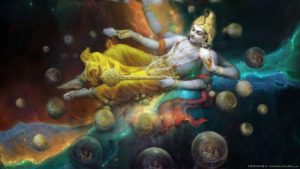
Madhvacharya was born Vasudev, son of Narayan Bhatt and Vedavati in the village of Padakakshetra, near Udupi usually taken as being 1238 AD., on the Vijay Dasami of Lord Rama. After 79 years of wonderful pastimes he passed on to be with his Lord, Shrila Vyasadev in the year 1317 AD.
This self realised soul, Mukhyapran (Vayu-deva) from an external point of view, accepted diksha from Achyutapreksha. However, Madhva always accepted only Shrila Vyasadeva as his source of inspiration and Lord of his life, and thus his ‘shiksha guru’. Shri Madhva himself quoted from Brahmanda Purana, “One should have complete faith in the transcendental literature such as Shrimad Bhagavatam and other literatures that directly glorifies the Supreme Personality of Godhead. One should also have faith in Vaishnava Tantra, the original Vedas, and Mahabharata which includes Bhagavad Gita, and which is considered the fifth Veda. The Vedic knowledge originally emanated from the breathing of Lord Visnu, and the Vedic literature has been compiled in a literary form by Shrila Vyasadeva, the incarnation of Vishnu. Therefore Vishnu should be understood to be the personal speaker of all this Vedic literature.” (excerpt from purport to Shrimad Bhagavatam 11:3:26., translation by Hridayananda Goswami.)
As the great incarnation of one of Lord Visnu’s greatest preachers, Vayudeva (Madhva) accepted direct instruction from his Lord, Shrila Vyasadeva. In the Agni Purana (Chapter 51.) it is mentioned how Vayu is seen sitting on the back of a deer holding a flag. Madhava was also quite often seen seated on a sacred deer skin holding his upraised flag of dualism in the form of his hand sporting two erect fingers protruding. One finger representing the Lord and the other the Jiva. Also in the Vana Parva of Mahabharata (19:22.) it is stated that Vayu is the messenger of the demigods, and in another place, that Vayu resides in the palace of Lord Brahma, continuously praising him for being the surrendered pure representative of the Lord. (Mahabharata, Sabha Parva, chapter 11 Text 20.).
It is interesting to note that Shri Vayudeva’s glories are sung in the Mahabharata, Vana Parva (19:22.) as being the messenger of the “Gods”.
On this matter, Acharya Madhava, as the re-establisher of a practically lost system, became the founder and saviour of the hearts of the Devotees. As we have said, though the line did in some shape or form come down, it was not truly effective until Madhava began preaching. On his preaching activities, writing of books, and touring all of Bharat-bhumi, he carried a new strength that was not there before him. He visited the secluded Himalayan ashrama of Shrila Vyasadeva, who, to this day, resides high in Uttara-Badri beyond the reach of sinful men. During the two visits it was revealed that even from a distance Madhava had realised the mind of Vyasa. Shrila Vyasadeva’s comments upon seeing Madhava’s commentary on Bhagavad Gita were that he could not fail it! In the sanctuary of the many Vaishnava saints and sages that surround Shrila Vyasa drinking up His association, Vyasa embrassed Madhava, and latter instructed Madhava to go and preach, and write commentaries on books to save man-kind. This is how Shripad Madhvacharya is accepted as the disciple of Shrila Vyasa, not by his own ambitions, but as His pure representitive and so the next in the ‘Guru parampara’.
A nine point summary or mission statement of Sripad Madhvacarya’s philosophy is:
1. Lord Vishnu, the Personality of Godhead, is the Absolute Truth, and nothing is higher than Him.
2. He, the Lord is known by the study of Vedas ‘sarvasya caham’ (Bhagavad Gita 15:15.)
3. The material world is real, but temporary.
4. The Jivas (living entities) are different from the Lord (‘bimba prati bimba’).
5. The Jivas are, by nature, servants of Lord Vishnu’s lotus feet.
6. In both the conditioned and liberated states, the Jivas are situated in higher and lower statuses and always remain individuals in their identity.
7. Liberation does not mean an impersonal merging, but the attainment of serving Lord Vishnu’s lotus feet.
8. Pure devotional service rendered to ‘guru’ and Vishnu automatically grants liberation, release from material bondage. There is no need of only seeking liberation. One only need seek pure devotional service.
9. ‘Pramanas’. Direct perception, logic and Vedic authority are three sources of actual knowledge.
Madhava literally had hundreds of disciples, yet towards the end of his life he selected a small number of the most dedicated around him. These are the original ‘Acharyas’ of the eight mutts found even today in Udupi, South Kanada district of Karnataka.






